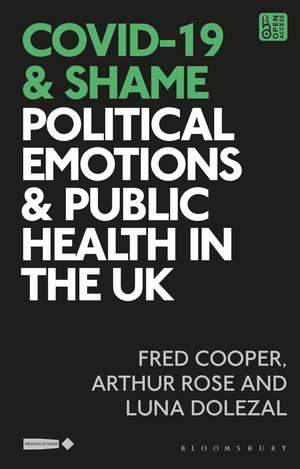COVID-19 and Shame: Political Emotions and Public Health in the UK: Critical Interventions in the Medical and Health Humanities
Autor Fred Cooper, Luna Dolezal, Dr Arthur Roseen Limba Engleză Paperback – 8 feb 2023
| Toate formatele și edițiile | Preț | Express |
|---|---|---|
| Paperback (1) | 99.19 lei 3-5 săpt. | +24.07 lei 7-13 zile |
| Bloomsbury Publishing – 8 feb 2023 | 99.19 lei 3-5 săpt. | +24.07 lei 7-13 zile |
| Hardback (1) | 302.22 lei 6-8 săpt. | |
| Bloomsbury Publishing – 8 feb 2023 | 302.22 lei 6-8 săpt. |
Preț: 99.19 lei
Preț vechi: 111.05 lei
-11% Nou
Puncte Express: 149
Preț estimativ în valută:
18.98€ • 19.82$ • 15.71£
18.98€ • 19.82$ • 15.71£
Carte disponibilă
Livrare economică 14-28 martie
Livrare express 28 februarie-06 martie pentru 34.06 lei
Preluare comenzi: 021 569.72.76
Specificații
ISBN-13: 9781350283404
ISBN-10: 1350283401
Pagini: 160
Dimensiuni: 138 x 216 x 11 mm
Greutate: 0.45 kg
Editura: Bloomsbury Publishing
Colecția Bloomsbury Academic
Seria Critical Interventions in the Medical and Health Humanities
Locul publicării:London, United Kingdom
ISBN-10: 1350283401
Pagini: 160
Dimensiuni: 138 x 216 x 11 mm
Greutate: 0.45 kg
Editura: Bloomsbury Publishing
Colecția Bloomsbury Academic
Seria Critical Interventions in the Medical and Health Humanities
Locul publicării:London, United Kingdom
Caracteristici
Provocative look at systemic failures during the COVID-19 pandemic across a variety of contexts (political, healthcare, domestic and social) to manage stigma and shame producing circumstances
Notă biografică
Fred Cooper is a research fellow at the Wellcome Centre for Cultures and Environments of Health, University of Exeter, UK. He is a historian of loneliness, health, medicine, and the psy and social sciences, and co-investigator (with Luna Dolezal and Arthur Rose) on the AHRC urgent grant 'Scenes of Shame and Stigma in COVID-19'.Luna Dolezal is an Associate Professor in Philosophy and Medical Humanities at the University of Exeter, UK.Arthur Rose is a Senior Research Fellow at the Wellcome Centre for Cultures and Environments of Health, University of Exeter, UK.
Cuprins
Introduction - 'The Public Shaming Pandemic' Chapter 1 - Covidiots!: The Language of PandemicChapter 2 - Super-spreaders: Shaming Healthcare ProfessionalsChapter 3 - Coughing while Asian: Shame and Racialized BodiesChapter 4 - "I was too fat": Boris Johnson and the Fat PanicChapter 5 - Good Solid British Common Sense: Shame and Surveillance in Everyday Life Chapter 6 - Operation Moonshot: Notes on Saving Face Conclusion - Beyond Plague Island
Recenzii
This book on COVID-19 and the role shame and shaming has played in the handling of the pandemic in the UK and elsewhere is much to be welcomed. It offers both a sophisticated understanding of a multidimensional concept and a wide-ranging analysis of its personal, social and political salience for pandemic governance and for how people struggled to make sense of their changed lives. The authors are to be congratulated for their accessible reporting of a ground-breaking piece of research.
Six detailed, very telling case-studies implicate each one of us in adding to the anguish of the pandemic. In the context of thousands of unnecessary deaths, we blame and shame others for sins of omission and commission of which we are probably equally guilty. But the lasting realization of this pioneering study of shame as a social emotion is that we have been deliberately manipulated by a shameless government intent on diverting attention from its own culpability.
COVID-19 and Shame ... offers an important and provocative examination of the role of shame in the UK's pandemic response during 2020. Across these distinct chapters, Cooper, Dolezal, and Rose highlight the multifaceted manifestations of shame and shaming within the context of Covid-19, and the book is well-structured to point to a central contention around the utilisation of shame at the expense of vulnerable and marginalised communities. Through well-chosen case studies and thoughtful analysis, each chapter furthers this argument poignantly and accessibly, advocating for 'public health work which takes shame seriously and sets out to avoid and reduce it' (p. 18). The book will be a welcome intervention in medical and health humanities, and will be of interest to scholars and general readers considering Covid-19, pandemic politics, and 'shame sensitive' approaches to public health.
Through both a "shame lens" and "shame sensitive practice," readers in the medical humanities will gain tools and theory to interrogate the relationship between emotions and medical practice, looking to the heart of healthcare in society.
Six detailed, very telling case-studies implicate each one of us in adding to the anguish of the pandemic. In the context of thousands of unnecessary deaths, we blame and shame others for sins of omission and commission of which we are probably equally guilty. But the lasting realization of this pioneering study of shame as a social emotion is that we have been deliberately manipulated by a shameless government intent on diverting attention from its own culpability.
COVID-19 and Shame ... offers an important and provocative examination of the role of shame in the UK's pandemic response during 2020. Across these distinct chapters, Cooper, Dolezal, and Rose highlight the multifaceted manifestations of shame and shaming within the context of Covid-19, and the book is well-structured to point to a central contention around the utilisation of shame at the expense of vulnerable and marginalised communities. Through well-chosen case studies and thoughtful analysis, each chapter furthers this argument poignantly and accessibly, advocating for 'public health work which takes shame seriously and sets out to avoid and reduce it' (p. 18). The book will be a welcome intervention in medical and health humanities, and will be of interest to scholars and general readers considering Covid-19, pandemic politics, and 'shame sensitive' approaches to public health.
Through both a "shame lens" and "shame sensitive practice," readers in the medical humanities will gain tools and theory to interrogate the relationship between emotions and medical practice, looking to the heart of healthcare in society.






